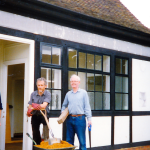Farnham
READ LOCAL EDITIONTOP STORIES

Mother’s Day 2025 at The Ivy
The two or three course set menu is perfect for celebrating mums and mother-figures from 28th March.

Ben Dobson’s charity run for Macmillan
Wormley runner shares his highly personal reason for running 2,853 miles

West End Village Society History Project
West End History Project is spreading its wings to build a collection of digital images to add to the 4,000 prints collected and as Guy Consterdine tells us they want your input

The best of the Surrey Hills
Enjoy four major events celebrating local food & drink, arts & craft and countryside living

Book for Farnham Literary Festival
Enjoy more than 50 different events taking place across over a dozen venues from March 6th-16th at this year’s Farnham Literary Festival as co-rdinator Theresa Gooda tells us

Alice Allan’s nature inspired book
Englefield Green writer Alice Allan’s new book The Whispering Trees is inspired by her love of the natural world and conservation

The Savoy Singers: She Loves Me
Jo Langdon tells us all about The Savoy Singers’ latest production, a delightful musical performance to warm your heart

Art to make you ‘appy!
AppArt celebrates 30 years of arts for everyone, the annual Easter Art Exhibition and Sculpture Trail, April 5th-20th, with artists from all over including Alton and the surrounding area as Gwyn Phillips tells us

Woking Young Musicians 2025
Young flautist Hanhan Qu said she feels “thrilled” to have won the Gordon Brown Woking Young Musician Trophy for the second year in succession.
No posts found
No posts found
No posts found
No posts found

ABOUT US
Over the Years

2025
Round & About now have 31 editions reaching over 620,000 homes each month
22 employees, and over 600 businesses advertising each month
2019
The team won gold for Commercial Team of the Year and Regional Media Brand of the Year
at the British Media Awards 2019
2016
Round & About held
the first of two SO
Food Festivals
in Wallingford in September



